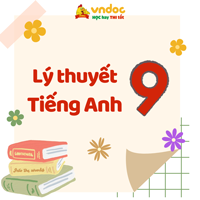Tuyển tập 100 đề thi tuyển sinh vào lớp 10 môn Tiếng Anh CÓ ĐÁP ÁN
Tuyển tập 100 đề thi tuyển sinh vào lớp 10 môn Tiếng Anh CÓ ĐÁP ÁN
Tuyển tập 100 đề thi tuyển sinh vào lớp 10 môn Tiếng Anh CÓ ĐÁP ÁN dành cho học sinh lớp 9 đang chuẩn bị thi tuyển sinh, giúp các em phát triển tư duy, năng khiếu các môn trong kì thi tuyển vào lớp 10. Chúc các bạn đạt được điểm cao trong kì thi này nhé.
Đề thi tuyển sinh vào lớp 10 môn Tiếng Anh năm học 2016 - 2017 Sở GD-ĐT Đồng Nai
Đề thi tuyển sinh vào lớp 10 môn Tiếng Anh năm học 2016-2017 tỉnh Thanh Hóa
Đề thi tuyển sinh vào lớp 10 môn Tiếng Anh năm học 2016-2017 tỉnh Thanh Hóa
PHẦN A: NGỮ ÂM. (1.0 điểm)
I. Chọn từ có phần gạch chân được phát âm khác so với các từ còn lại.
1. A. passed B. watched C. played D. washed
2. A. which B. champion C. chairman D. headache
II. Chọn từ có trọng âm chính rơi vào vị trí khác so với các từ còn lại.
1. A. polite B. student C. easy D. champion
2. A. destroy B. appear C. happen D. provide
PHẦN B: NGỮ PHÁP VÀ TỪ VỰNG. (4.0 điểm)
I. Cho dạng đúng của động từ trong ngoặc để hoàn thành các câu sau:
1. The doctor advised him (get up)........early.
2. The students (play)........with the ball in the schoolyard now.
3. She didn't use to (work)........hard.
4. Mary (visit)........Ha Long Bay last week.
5. Nga (not prepare)........her lessons yet.
6. He (watch)........television when the telephone rang.
7. English (speak)........all over the world.
8. Unless she (study)........hard, she won't pass the exam.
II. Chọn một từ đúng trong ngoặc để hoàn thành các câu sau:
1. We are students. .........school is in the town. (Our/ Us)
2. He has been an engineer........15 years. (since/ for)
3. Nam didn't go to work yesterday........his illness. (because of/ despite)
4. We feel very......today. (happy/ happily)
5. The.....growth rate of Vietnam reached about 8.0% in 2007. (economy/ economic)
6. The book.....is on the table belongs to my brother. (whose/ which)
7. Ho Chi Minh was born......May 19th, 1890 in Nghe An. (in/ on)
8. My mother is a good......... (cook/ cooker)
PHẦN C: ĐỌC HIỂU. (2.5 điểm)
I. Chọn từ thích hợp trong ô dưới đây điền vào mỗi chỗ trống để hoàn thành đoạn văn.
population - and - known - tropical - countries - largest
Malaysia is one of the (1)......of the Association of South-East Asia Nations (ASEAN). It is divided into two regions, (2)......as West Malaysia and East Malaysia. They are separated by about 640 km of the sea and together comprise an area of 329,758 sq km. Malaysia enjoys (3)......climate. The Malaysian unit of currency is the ringgit. The capital of Malaysia is Kuala Lumpur and it is also the (4)......city of the country. The (5)......in 2001 was over 22 million. Islam is the country's official religion. In addition, there are other religions such as Buddhism (6)......Hinduism. The national language is Bahasa Malaysia (also known simply as Malay). English, Chinese, and Tamil are also widely spoken.
II. Đọc đoạn văn và trả lời các câu hỏi.
If you are invited to someone's house for dinner in the United States, you should bring a gift, such as a bunch of flowers or a box of chocolates. If you give your host a wrapped gift, he/ she may open it in front of you. Opening a present in front of the gift-giver is considered polite. It shows the host is excited about receiving the gift and wants to show his/her appreciation to you immediately. Even if the host doesn't like it, he/ she will tell a "white-lie" and say how much they like the gift to prevent the guest from feeling bad. If your host asks you to arrive at a particular time, you should not arrive exactly on time or earlier than the expected time, because this is considered to be potentially inconvenient and therefore rude, as the host may not be ready.
1. What should you bring when invited to someone's house for dinner in the United States?
2. Is opening a present in front of the gift-giver considered polite?
3. Why is it considered polite when opening a present in front of the gift-giver?
4. What should the host do if he/ she does not like the gift?
PHẦN D: VIẾT. (2.5 điểm)
I. Chọn từ hoặc cụm từ gạch chân (A, B, C hoặc D) được sử dụng chưa đúng.
1. (A) The woman (B) whom helped you (C) this morning (D) is my teacher.
2. (A) It was not easy (B) for us (C) getting tickets for (D) the concert.
II. Viết lại các câu sau sao cho nghĩa không thay đổi so với câu ban đầu, bắt đầu bằng từ gợi ý.
1. "I come from Thanh Hoa," Mr. Ba said.
Mr. Ba said that..........................................
2. We don't have a big house.
We wish......................................................
3. It was too cold for us to go swimming.
It was not.............................................
4. It's very wonderful to spend a week in the countryside.
Spending................................................
5. In spite of having little money, they are very happy.
Although..................................................
II. Sắp xếp các từ, cụm từ thành câu hoàn chỉnh.
1. than/ brother/ more/ drive/ my/ more carefully/ I/.
2. she/ cook/ sister/ to/ Your/ how/ does/ know/ doesn't/,/?
3. was/ Everyone/ had/ the/ good/ finished/ in/ because/ mood/ they/ a/ course/.
Đáp án Đề thi tuyển sinh vào lớp 10 môn Tiếng Anh tỉnh Thanh Hóa
PHẦN A: NGỮ ÂM.
I. 1. C. played /d/ - 2. D. headache /k/
II. 1. A. políte - 2. C. happen
PHẦN B: NGỮ PHÁP VÀ TỪ VỰNG.
I.
1. to get up - 2. are playing - 3. work - 4. visited - 5. has not prepared -
6. was watching - 7. is spoken - 8. studies
II.
1. Our - 2. for - 3. because of - 4. happy - 5. economic - 6. which - 7. on - 8. cook
PHẦN C: ĐỌC HIỂU.
1. countries - 2. known - 3. tropical - 4. largest - 5. population - 6. and
II.
1. We should bring a gift, such as a bunch of flowers or a box of chocolates.
2. Yes, it is.
3. Because it shows the host is excited about receiving the gift and wants to show his/her appreciation to you immediately.
4. he/ she should tell a "white-lie" and say how much they like the gift to prevent the guest from feeling bad.
PHẦN D: VIẾT.
I. 1. B. whom => who - 2. C. getting => to get
II.
1. Mr. Ba said that he came from Thanh Hoa.
2. We wish we had [or We wish to have] a big house.
3. It was not warm enough for us to go swimming.
4. Spending a week in the countryside is very wonderful.
5. Although they have little money, they are very happy.
III.
1. I drive more carefully than my brother.
2. Your sister doesn't know how to cook, does she?
3. Everyone was in a good mood because they had finished the course.
Đề thi tuyển sinh vào lớp 10 môn Tiếng Anh năm học 2016-2017 tỉnh Phú Thọ
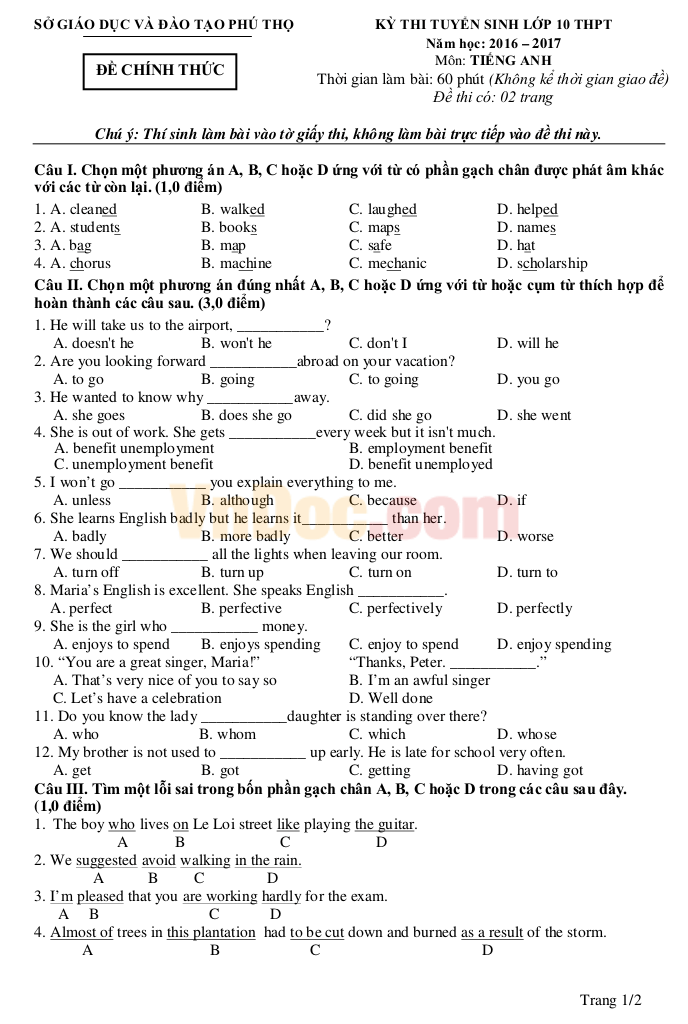
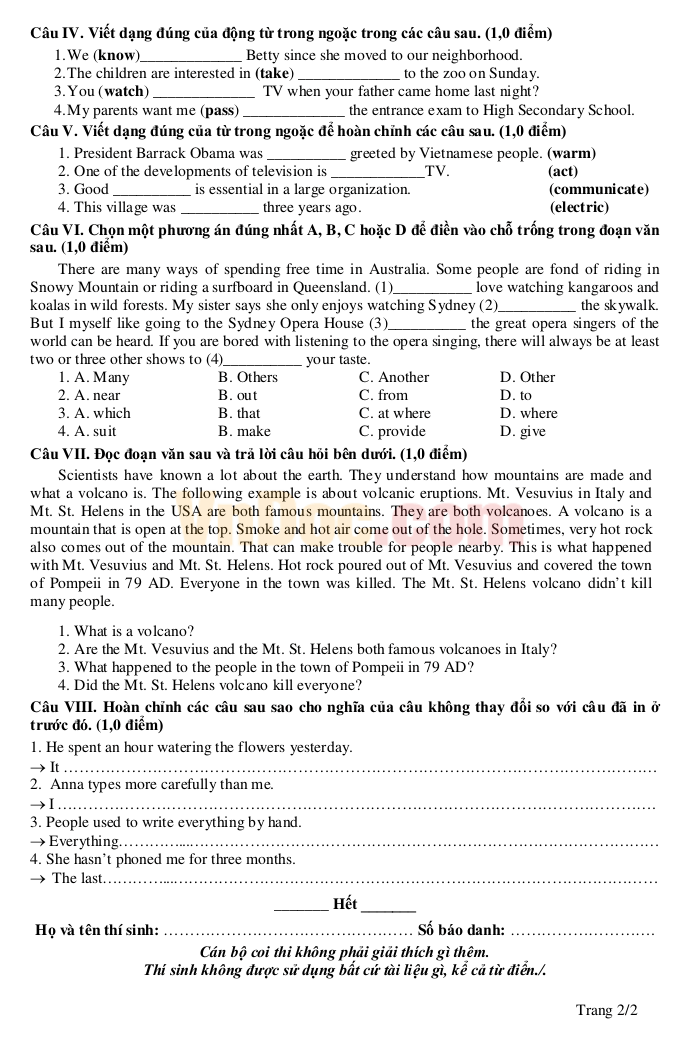
Đáp án Đề thi tuyển sinh vào lớp 10 môn Tiếng Anh tỉnh Phú Thọ
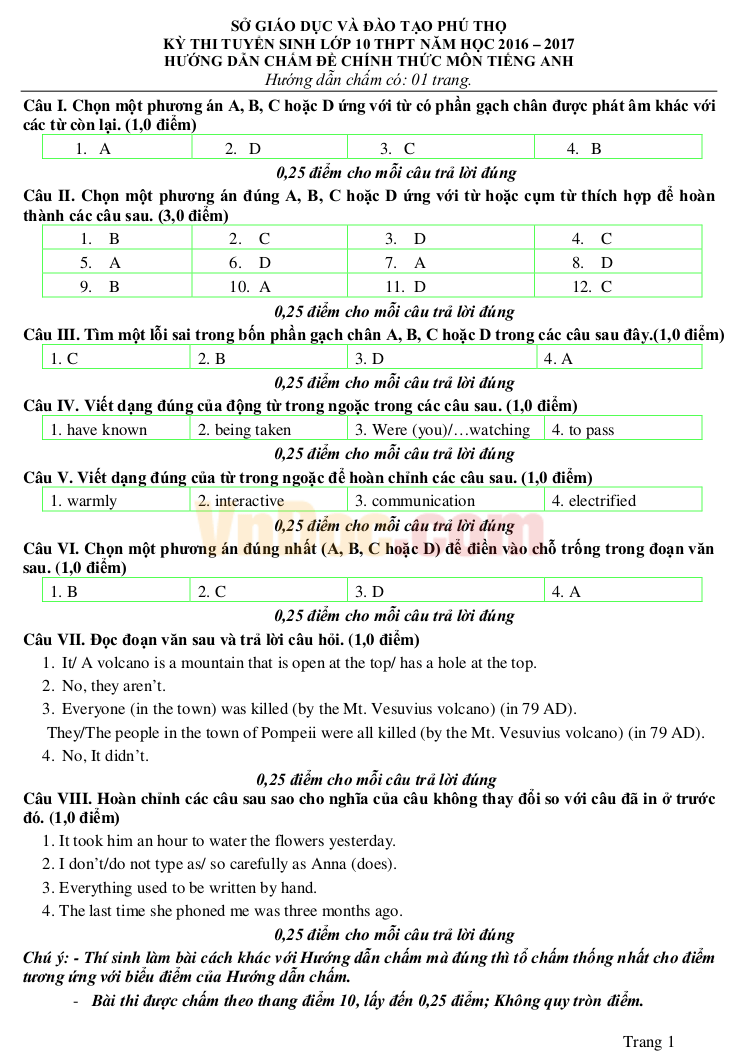
Đề thi tuyển sinh vào lớp 10 THPT Chuyên môn Tiếng Anh (Đề Chuyên)
I. LISTENING: (2 points)
PART 1: There are 5 questions in this part. For each question there are three pictures and a short recording. Listen to each recording twice. Choose the correct picture (A, B or C) and write it in the numbered box on your answer sheet. (1 point)
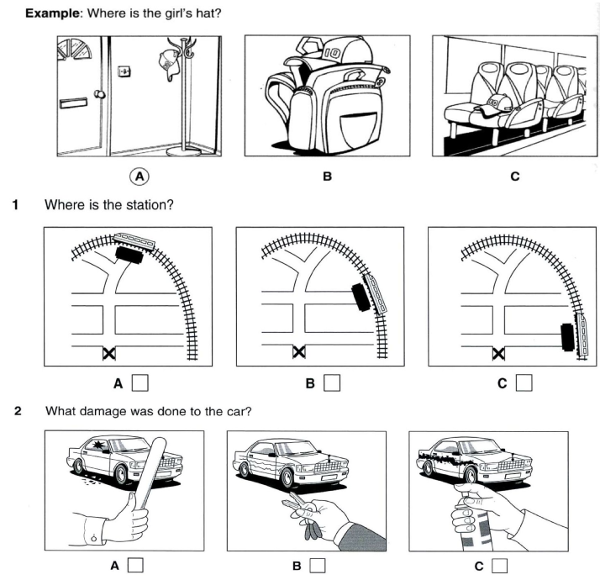
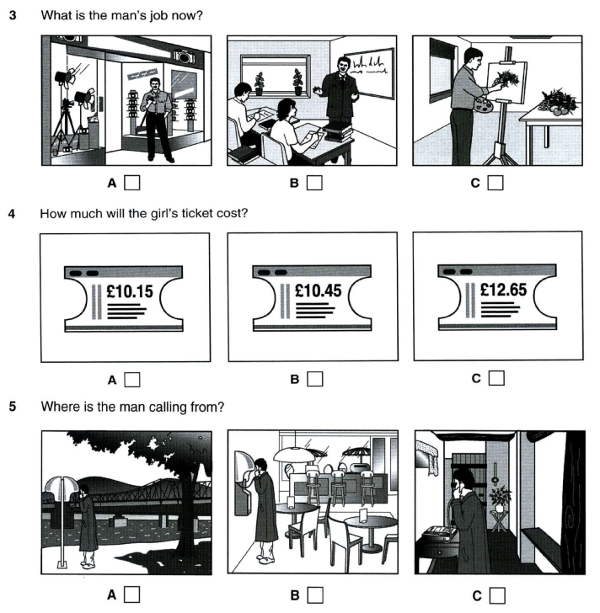
PART 2: You will hear a conversation between a man, Marco, and his wife, Sarah, about a film they have just seen at the cinema. Decide if each sentence is correct or incorrect. If it is correct, write the letter (A) for YES, if it is not correct, write the letter (B) for NO in the numbered box on your answer sheet. (1 point)
| A | B | |
| YES | NO | |
1. Sarah was expecting to enjoy the film. 2. Marco and Sarah agree that the city in the film was London. 3. Marco feels that the length of the film made it rather boring. 4. Sarah was upset about how some of the audience behaved during the film. 5. Sarah was disappointed with the way the main actor performed. |
II. READING: (2 points)
PART 1: Read the following passage, then choose the answer (A, B, C or D) which you think fits best according to the text. Write your answer in the numbered box on your answer sheet. (1 point)
Whole families of musicians are not exactly rare. However, it is unusual to come across one that includes not only writers and performers of music, but also an instrument maker.
When South Wales schoolteachers John and Hetty Watkins needed to get their ten-year-old son, Paul, a cello to suit his blossoming talents, they baulked at the costs involved. "We had a look at various dealers and it was obvious it was going to be very expensive," John says. "So I wondered if I could actually make one. I discovered that the Welsh School of Instrument Making was not far from where I lived, and I went along for evening classes once a week for about three years."
"After probably three or four goes with violins and violas, he had a crack at his first cello," Paul, now 28, adds. "It turned out really well. He made me another one a bit later, when he'd got the hang of it. And that's the one I used right up until a few months ago." John has since retired as a teacher to work as a full-time craftsman, and makes up to a dozen violins a year – selling one to the esteemed American player Jaime Laredo was "the icing on the cake".
Both Paul and his younger brother, Huw, were encouraged to play music from an early age. The piano came first: "As soon as I was big enough to climb up and bang the keys, that's what I did," Paul remembers. But it wasn't long before the cello beckoned. "My folks were really quite keen for me to take up the violin, because Dad, who played the viola, used to play chamber music with his mates and they needed another violin to make up a string trio. I learned it for about six weeks but didn't take to it. But I really took to the character who played the cello in Dad's group. I thought he was a very cool guy when I was six or seven. So he said he'd give me some lessons, and that really started it all off. Later, they suggested that my brother play the violin too, but he would have none of it."
"My parents were both supportive and relaxed," Huw says. "I don't think I would have responded very well to being pushed. And, rather than feeling threatened by Paul's success, I found that I had something to aspire to." Now 22, he is beginning to make his own mark as a pianist and composer.
Meanwhile, John Watkins' cello has done his elder son proud. With it, Paul won the string final of the BBC Young Musician of the Year competition. Then, at the remarkably youthful age of 20, he was appointed principal cellist of the BBC Symphony Orchestra, a position he held, still playing his father's instrument, until last year. Now, however, he has acquired a Francesco Rugeri cello, on loan from the Royal Academy of Music. "Dad's not said anything about me moving on, though recently he had the chance to run a bow across the strings of each in turn and had to admit that my new one is quite nice! I think the only thing Dad doesn't have – and may acquire after about 50 – 100 years – is the power to project right to the back of large concert halls. It will get richer with age, like my Rugeri, which is already 304 years old."
Soon he will be seen on television playing the Rugeri as the soloist in Elgar's Cello Concerto, which forms the heart of the second programme in the new series, Masterworks. "The well-known performance history doesn't affect the way I play the work," he says. "I'm always going to do it my way." But Paul won't be able to watch himself on television – the same night he is playing at the Cheltenham Festival. Nor will Huw, whose String Quartet is receiving its London premiere at the Wigmore Hall the same evening. John and Hetty will have to be diplomatic – and energetic – if they are to keep track of all their sons' musical activities over the coming weeks.




